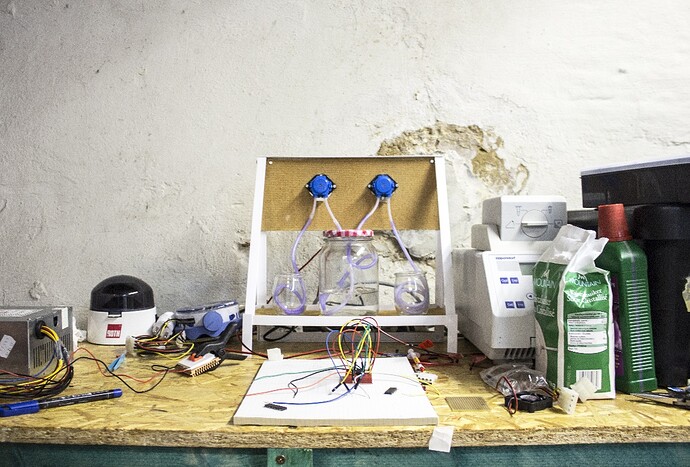In April 2017 I was selected as an OpenCare Community Fellow by SCimPULSE Foundation and Edgeryders. The goal: curate a theme on citizen and open science at the OpenVillage Festival on October 19-21. This series of blogs is an ongoing report.
June has been an instructive and productive month. The OpenVillage program is becoming concrete, my own learning is accelerating and the projects I’m involved in are going through a transition phase.
Shaping a program
The OpenVillage program I had in mind when starting my curation task has completely changed and keeps doing so. Well, yes and no. The people and projects come and go, however the questions remain the same. We really are all in the same boat when it comes to the obstacles we face.
Olivier from echOpen summed up their issues in a conversation we had. They nicely cover most obstacles:
- How to put everyone together productively without eg. 2 people having to work full time? Two aspects: community management and information sharing.
- Legal frameworks and patents. How to make things reusable for everyone regarding regulatory and patent framework?
- Reliability and safety. How can you ensure that the community with its contributions (the sum of all) are good quality and safe?
- Economic model. We have no capital, no investors, no shares. We use other channels like foundation money, but this is not sustainable. How do you sustain a project?
These have been the issues of many open.citizen science projects, including ones I am involved in. Even beyond citizen.open science this is true. On June 28th we had a community call to discuss common threads across the themes at the festival. Focus points will be funding and funding policies and coordination overhead.
There is however another issue that many of us don’t think of immediately. It takes a more long term perspective: funding policy. The DIY Science Network seeks to address this, as separate projects most often don’t have the time, network or expertise to invest. Through conversations with Lucy Patterson, two questions emerged:
- How do we encourage funders to support DIY science initiatives now?
- And, longer term, how can we foster a funding culture that is supportive of non-institutional science?
The DIY Science Network will work on these questions over the summer, at the OpenVillage Festival and hopefully long after that.
These are just some of the sessions that have taken shape in the last weeks. At the moment, the sessions in the theme look like this.
Learning
Meanwhile, my learning path is gratifying. I’m getting a better feel of the field by talking to a diverse set of people, getting out there at different events and synthesizing what I see and hear in posts like this. For my curation work, it has been important: I ask better questions. While buried in the daily tasks of keeping a project afloat, this would have been impossible.
Another rich learning aspect is my involvement in the Open Insulin project. I experience the dynamics, obstacles and opportunities in a complex citizen science project firsthand, much more explicit than in any project I have done before. The lessons have not fully formed yet, but my initial assumptions have certainly been challenged. I hope to clear this out in the next months and report on it.
Anthony pointed out one of the aspects in a preparation call for his session at OpenVillage. No one in the team has the time to put into organising or documenting information. So with people dropping in and out (especially experts), knowledge gets lost easily. Counter Culture Labs has made efforts in finding a solution, such as involving an organisational expert, yet without lasting effects.
With global collaboration on Open Insulin taking off, this becomes a necessary improvement. Luckily for CCL, it does not cause much trouble within their team. It is a relatively minor obstacle they have at the moment.
Transition dynamics
The projects I am involved in (ReaGent, Ekoli & Break it Down) are going through transition phases. This requires us to take a step back and deconstruct what we’re doing. It comes at a good time when I’m doing such in depth work with other, often similar projects for OpenVillage.
We break down many of the processes that we have, eg. logistics for running the lab space as a community, with the purpose of building new ones. This process unearths dynamics that would otherwise be harder to spot for the community, such as the difference between being an open lab and being a shared lab. And then what that means for being an open, shared lab.
Mid June we had a workshop with the ReaGent team to look closer at our strategy and implementation for the shared lab space. It was fruitful and is the first of several sessions this summer across our organisations to get everyone aligned. In our next location, the financial pressure from the rent will be higher. We need to prepare. Set up our business models and synergies between all organisations. Design the next iteration for resilience.
In July I’m attending a Biohackathon in Waag in Amsterdam, where I’ll meet many protagonists in citizen.open science & DIYbio. Over the next weeks, we’re also moving into logistic planning for the sessions at the festival and picking up communication efforts.
This blogpost has been realised as part of the OpenCare Community Fellowship Program with the support of SCImPULSE Foundation.
